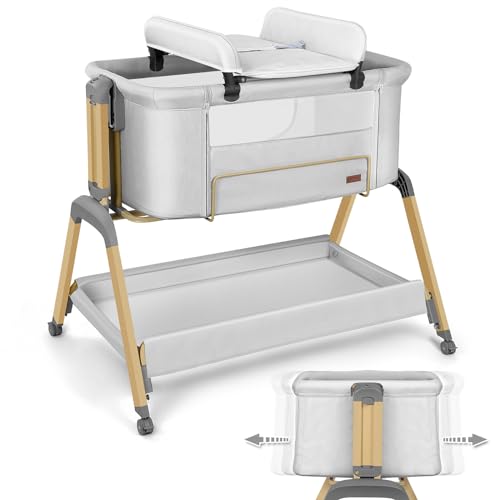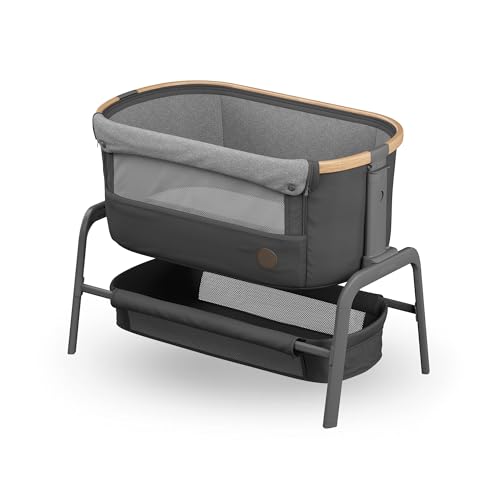You'll Be Unable To Guess Bedside Cosleeper's Secrets
페이지 정보

본문
 Bedside Cosleeper
Bedside CosleeperA bedside cosleeper can be described as a bassinet that connects to the side of your adult bed. If you stick to the CSPC guidelines for sleeping spaces for infants it's secure.
 These guidelines are similar to the crib bedding standards. Learn more about the guidelines here. The most important aspects to take into consideration when selecting the right bedside sleeper are Safety Comfort, Convenience, and Safety.
These guidelines are similar to the crib bedding standards. Learn more about the guidelines here. The most important aspects to take into consideration when selecting the right bedside sleeper are Safety Comfort, Convenience, and Safety.Safety
Many new parents and expectant mothers have chosen to cosleep, also known as bed-sharing, in line with the American Academy of Pediatrics recommendation that infants should be in the same room as their parents. The Academy notes that room-sharing is more secure than sleeping with a baby in the same bed as it lowers the chance of Sudden Unexpected Death in Infants or SIDS. The AAP does not recommend bed-sharing however it does suggest that co-sleeping on separate sleeping surfaces is a good option to lower the risk of SIDS. The creation of the bedside crib was essential for many families.
A travel bedside crib cosleeper is a similar to a crib sleeper that attaches to an adult bed frame. The bedside cots for newborns cosleeper helps parents keep an eye on their baby and allows them the option of sleeping in their own bed. The most reliable cosleepers meet strict safety standards and are built with sturdy, high-quality materials. To ensure your child's safety ensure that you look for the Juvenile Products Manufacturers Association stamp of approval. This proves that the product has been tested thoroughly and quality control.
The safety of a bedside cosleeper is contingent on a variety of factors, including the way it is set up and secured to the parent's bed. If the bedside cot mattress cosleeper is not connected to the bed of the parent in a way that prevents the gaps and spaces where an infant could be trapped, it could pose an hazard of suffocation. It is essential that the attachment system used for a bedside sleeper be tested to ensure that it can withstand forces that may be applied during use, such as the parent bouncing on and off the sleeper. horizontal force applied to the attachment system or the corners of the Bedside cosleeper (http://www.Annunciogratis.net/).
The standard that is voluntary for bedside beds incorporates by reference to the federal consumer safety standard for products such as bassinets and cradles (16 CFR part 1218) and includes requirements for the performance of fabric-sided enclosed openings. The standard's requirements for mandatory compliance deal with the risk of neck and head entrapment by requiring that, after the application and release 50 lbs. The standard also states that after the application and release of 50-lb. It is not permitted to create a gap greater than 1.0 in. The standard is not available for reading. can be obtained from ASTM's online Reading Room.
Convenience
Many parents are reluctant to cosleep because they are afraid of being suffocated or SIDS, or because it's a "Ferberization" that forces children to sleep on their own. However, anthropologists have observed for a long time that many primates, mammals, and people from non-Western cultures sleep regularly. This is due to the fact that babies are soothed by hearing their mother's voice, and can also learn to self-soothe.
The top bedside sleepers have clever design that can be attached to the side of a bed and swivels for ease of access to feedings in the middle of the night or diaper changes. Look for one with feet that are adjustable and retract to accommodate different mattress sizes, and a big storage compartment to store all of the necessities for your baby bedside sleeper.
Choose a bedside sleeper that will fit the standard crib bedding, so that it is safe to use as your child grows. Think about a model that's convertible and can be used as a play yard or a more substantial bassinet. It will last for a long time.
Portability
Based on the size of your bedroom a bedside sleeper with wheels and/or a light base might be easier to move around your home than one with a heavy wood frame or massive base. The babybay bedside sleeper HALO bassiNest essencetia, and Snoo Smart Sleeper are all portable. They have adjustable feet that can be retracted to accommodate platforms and legs that fold inwards to allow maximum proximity to the mattress; 100 mesh sidewalls that allow airflow without covering baby's mouth or nose.
The Arm's Reach ClearVue is a top option. It adjusts in 1" increments and can be used as a bassinet or portable bed. It also swivels to allow for quick access to baby so that you can soothe and nurse her or check on her throughout the night.
- 이전글The 10 Most Scariest Things About Baby Beds 24.12.23
- 다음글Five Killer Quora Answers On Asbestos Mesothelioma Lawyers 24.12.23
댓글목록
등록된 댓글이 없습니다.